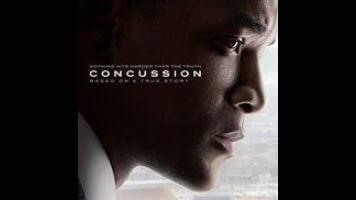Will Smith’s confidence goes quiet in the workmanlike Concussion

Concussion takes two things that America has consistently loved—Will Smith and investigative medical procedurals—and pits them against an even bigger cultural touchstone: the NFL. Smith plays Dr. Bennet Omalu, a Nigerian doctor working in Pittsburgh who examines the body and brain of deceased local hero Mike Webster (David Morse). In investigating how and why a 50-year-old man could die mysteriously after experiencing symptoms of dementia, forensic pathologist Omalu uncovers the NFL concussion crisis—the brain damage that can result after football players experience repeated concussions. The organization, depressingly but unsurprisingly, is not interested in his results beyond what it can do to discredit them.
Initially, Concussion follows Omalu and Webster in parallel, until they meet, such as it is, during Webster’s autopsy. It’s a procedure many in Pittsburgh would prefer not be conducted at all, out of a misguided form of respect. Because he doesn’t follow American football (and in fact only owns a television set in deference to American cultural norms), Omalu doesn’t recognize Webster, and one of the most interesting aspects of the film is the way it operates at least in part from an outsider’s view of the game’s brutality. “God did not intend for us to play football,” he says at one point, and the movie does not regard this view as absurd.
To the extent that Concussion can make its material—heavy on shots of people looking at microscopes and lots of talk about the ramifications of Omalu’s discovery—more cinematic, it does so by framing itself as an immigrant story. Omalu holds the United States in the highest esteem, and connects with Prema Mutiso (Gugu Mbatha-Raw), another recent transplant who starts as his houseguest and winds up his wife. Smith, despite slipping into an African accent and ditching his most recognizable mannerisms, still plays a man of superhuman confidence. But he nimbly transforms his usual movie-star cockiness into a soft-spoken calm; outfitted with a ridiculous number of degrees (not just in several fields of medicine but also music and, in progress as the movie begins, business), Omalu has no doubts about his research. His hesitation takes hold only when the country he idolizes has produced an environment where his findings are treated with hostility or even threats to his family.
Smith’s Omalu makes a compelling character, supported by his mentor Cyril Wecht (Albert Brooks) and former team doctor Julian Bailes (Alec Baldwin). But Concussion doesn’t crackle like the best whistleblower dramas. Writer-director Peter Landesman, shooting Pittsburgh in grays, blues, and blown-out whites, sometimes smothers the action with excessive close-ups, and once the research and discovery portions finish up, the movie’s righteousness (“Tell the truth!” becomes Omalu’s mantra) can only take the story so far. The movie could have used a dialogue specialist like Aaron Sorkin to punch up the outraged banter—especially with the velvety tones of Baldwin and the wryness of Brooks both on hand, begging for better-than-serviceable lines.
As is, Concussion is thoughtful but workmanlike, and not quite up to a full exploration of the issues it raises. In particular, it pays lip service to the “beauty” of football, repeatedly suggested by Prema, without bothering to suggest how to reconcile that beauty with its potential to cause regular life-threatening injuries. There may be a story here about the country’s self-destructive love affair with a sport owned and operated by a massive, wealthy corporation, told through the eyes of an overachieving immigrant. But in the end, Concussion sticks to the kinds of points that could be conveyed just as well by a magazine article (it’s based on one: “Game Brain,” a piece in GQ). It’s an advocacy movie that doesn’t advocate for anything beyond its already-vindicated hero.